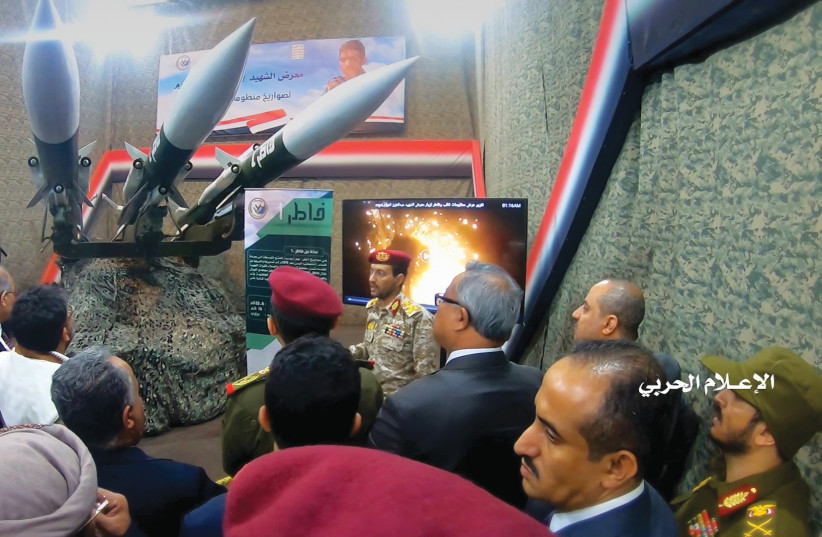The Houthi movement will not oppose an extension of the UN-brokered cease-fire with the Saudi-led Arab coalition, Mahdi al-Mashat, the chairman of the Yemeni movement’s Supreme Political Council, said on Sunday.
For more stories from The Media Line go to themedialine.org
“We affirm that we are not against the extension of the truce, but what is not possible is accepting any truce in which the suffering of our people continues,” Mashat, the de facto president of Yemen, said in a speech carried by the movement’s Al Masirah television channel.
The truce, the first in Yemen since 2016, began on April 2 and was signed for two months. The United Nations is trying to extend it, aiming to finally bring the parties to the civil war to formal negotiations for peace.
The war in Yemen erupted in 2014 when the Houthi insurgent group, which is aligned with Iran, took control of the country’s capital Sanaa and, in January 2015, forced President Abed Rabbo Mansour Hadi to resign. A month later, Hadi rescinded his resignation, and in March, a Saudi-led coalition intervened against the Houthis. The civil war has created one of the worst humanitarian crises of the modern era.
Hannah Porter, a Yemen analyst at the Washington-based DT Global international development firm, told The Media Line the Houthis have always publicly voiced support for a cease-fire as long as it is on their terms, including the reopening of Sanaa International Airport and the end of coalition airstrikes.

For the time being, she said, “it appears that the Houthis have secured this, so there is little incentive for them to change tack.”
This could change, of course, Porter added, “but the Houthis will always claim that they are the ones pushing for peace and a lasting cease-fire.”
Laura Cretney, a political consultant and a doctoral student at Durham University researching the conflict in Yemen and the role of the Yemeni diaspora in the Middle East, told The Media Line it is not in the Houthis’ interest to appear to be against peace.
“The Houthis have become experts in playing politics and the media, using declarations such as this to buy time and maximize gains,” she said. “The Houthis are ‘not against’ extending the truce but have made no explicit commitment” to accept it, Cretney continued.
In any case, it does not suit either side to break the truce for the time being.
The Houthis “have little to gain from resuming unprovoked cross-border strikes on Saudi territory,” Porter added.
If the Houthis resumed these attacks, they could see a reversal of progress on issues such as fuel shipments and the reopening of Sanaa airport, she explained. Additionally, coalition airstrikes would likely resume.
Cretney added that by extending the truce and joining the negotiations that the UN is seeking to achieve, the Houthis could also gain the international recognition that they have been long looking for.
The truce has brought direct benefits to the Houthis, Cretney also said, citing the clearances for oil tankers to unload in the port of Hodeidah, the resumption of flights at Sanaa airport, and the international engagement surrounding the truce.
Extending the truce would also suit the Saudis.
The Saudi campaign in Yemen has been hugely costly and has failed to achieve its main goal of removing the Houthis from power, Cretney pointed out.
“The current truce and any possible subsequent negotiations represent an opportunity for the Saudis to extricate themselves from the conflict without admitting defeat,” she continued.
Porter believes this would be a good first step toward future negotiations, “but there is a long road ahead.”
Still, she said that nothing is for sure when talking about the war in Yemen. “Like in other stages of Yemen’s conflict, events can change at a moment’s notice, and everyone should be very cautious with their optimism about this truce,” she said.
“There is no guarantee that the truce will lead to formal negotiations,” Cretney agreed, “and indeed certain components of the truce have yet to be implemented, including the lifting of the siege of Taiz by the Houthis.”
However, Cretney listed a series of developments due to the truce that she believes have created momentum for political negotiations.
“Violence has significantly decreased, a small number of commercial flights to Sanaa airport have resumed, and President Hadi – long seen as a major blocker to peace – resigned in April, to be replaced by an eight-member Presidential Council,” she said.
Although much remains uncertain, said Cretney, these developments have certainly given Yemenis a reason to be optimistic that a path to peace is possible.
Porter said that for negotiations to be successful, the inclusion of underrepresented and marginalized groups is essential, but at the same time, this would make the peace process more complex.
